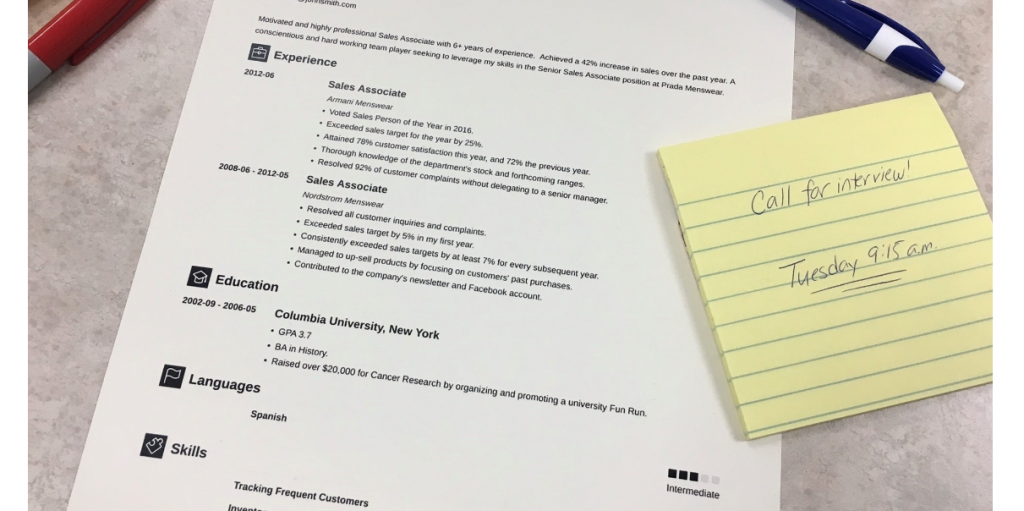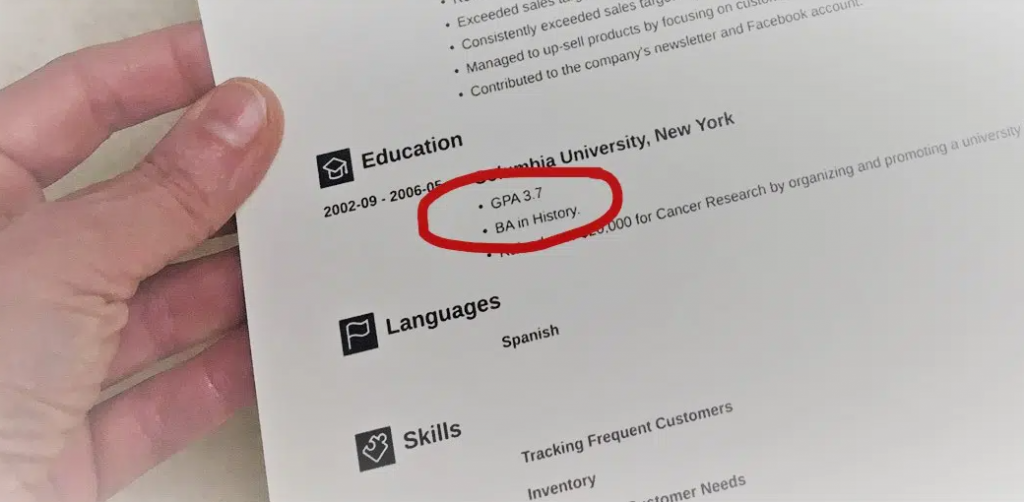Everyone knows that lying on resumes about their education, academic degree or certificates is a bad idea. We’ve all heard horror stories of people being caught in lies and then losing their job. But what about rounding up your GPA on your resume? Can you do that without getting into trouble?
Should you include GPA in your resume and how?

Grade Point Average or GPA is a number that reflects your overall academic performance for a certain period of time, usually four years for a Bachelor’s degree. It is calculated by taking the average of all your grades and weighting them according to how many credits each course was worth. For example, if you got an A in a three-credit course, it would be worth 3 points. If you got a B in a four-credit course, it would be worth 2.8 points.
So, how can you include GPA in the resume? Well, it really depends on how high or low your GPA is. If it’s on the higher side, somewhere between 3.5 to 4.0, then you can include it in your resume without rounding it up. Add it to the section Certificates or Achievements along with other relevant information such as the name of your university, degree, and year of graduation.
Here is an example of how you can add GPA to your resume:
Achievements:
- Graduated with honors from XYZ University in 2020
- GPA 3.8/4.0
If your GPA is lower than 3.5, you may want to think twice before including it in your resume. In fact, you may want to round it up a little bit to make it look better. For example, if your GPA is 3.2, you can round it up to 3.5 on your resume.
However, there is a risk involved in rounding up your GPA on your resume. If your potential employer decides to verify your educational information and finds out that you have lied about your GPA, it will reflect poorly on you and may even cost you the job opportunity.
Can you round up GPA on resume?
Your GPA isn’t the only thing that counts when you’re job hunting, but it’s still important to make sure your resume looks as good as possible. So should you round up your GPA on your CV? While a small rounding might not seem like a big deal, some experts recommend against it. It’s fine to round your GPA down to a single decimal place. A difficulty arises if you change it from 3.90 to 4.00. The “perfect Grade Point Average,” as it is known, should be 4.00 real.

In fact, rounding up the GPA results in an ethical dilemma. Many recruiters are strongly against it and may consider it lying. In their opinion, you should either attach the transcript with the courses and grades obtained or simply not include the GPA in the resume.
The same rule applies to other information such as dates of employment, job titles, and responsibilities. You should never lie or exaggerate about your work experience on a resume. It’s always better, to be honest, and let your qualifications speak for themselves.
How to round up and won`t be fired?
Well, to round up your GPA, you need to take your transcripts to the office of the registrar and petition for a change. This is usually only allowed for extenuating circumstances, such as an administrative error.
There are several ways to round up your GPA:
- Use terms such as “GPA: Above 3.5” or “GPA: In the top 10% of the class”
- Mention your major GPA if it’s higher than your overall GPA
- Highlight other relevant information such as awards, scholarships, and internships
All these methods will help you present your GPA in the best possible light without resorting to lying.
The grades may be rounded up to the nearest hundredth or by rounding only one decimal place. Rounding up to the nearest hundredth doesn’t make much of a difference – for example, if your actual GPA is 3.44, it will be rounded up to 3.45. The one-decimal round-up means that a Grand Point Average of 3.49 becomes a 3.5 – which has more weight than a GPA of just under 3.5.

What you shouldn`t do when rounding up GPA?
A rounding grade point average on a resume to the nearest tenth is also permissible; however, it is not recommended since it may appear unethical. This will be a problem in particular if the employer requests transcripts and compares grades.
Some applicants choose to leave their GPAs off their resumes altogether. This is perfectly acceptable since it’s not required information. If you decide to do this, simply don’t include a GPA section on your resume.
For example, if you have a GPA of 2.7 and decided to round up it to 3.7, which is obviously a fake number, the employer will eventually find out and think that you`re trying to mislead them.
Another issue comes when applicants want to round up their weighted GPAs. This is not recommended since it can again be considered misleading information. So, in case you have a weighted GPA, it`s best to report it as is. The same goes for unweighted GPAs. You shouldn`t try to round them up since this will only make things worse and can even cost you the job opportunity.
To sum up, rounding up your GPA on a resume is not something you should do since it may result in negative consequences. It`s best to just leave it off your resume or report it as is.
Do employers check info from the resume?
Nowadays more and more employers are starting to check the information that applicants put on their resumes. This means that you should be extra careful about the information you include on your resume. One question that often comes up is whether or not you can round up your GPA on your resume.
The first thing that job seekers frequently ask is if a prospective employer will be able to run a background check to see if they had worked at any of the companies listed on their resume. The answer is no: there isn’t, and there never has been, a central database that collates a comprehensive list of all the jobs you’ve ever held.
However, when you apply to a big company or your employer is very serious and attentive to details, they may recheck all the info in the resume, especially when it comes to your work experience and education. The same comes to your GPA results.

But what happens when you were fought on lying? Will you just lose your job? It may happen that you`ll not only lose the job but also get in some kind of trouble since it`s considered as fraud. So, if you don`t want to get into any problems, it`s best to avoid rounding up your GPA on a resume and just report it as is. This way you won`t have to worry about anything and can focus on getting the job you want.
Conclusion
As you can see, there are some risks associated with rounding up your GPA on a resume. It`s best to just report it as is or leave it off your resume altogether. This way you won`t have to worry about anything and can focus on getting the job you want.
